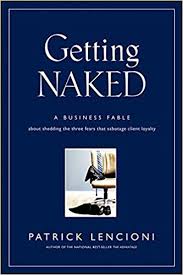A Business Fable About Shedding the Three Fears that Sabotage Client Loyalty
Let’s first address the obvious: this book has an eye-catching and even provocative title. However, what Lencioni is referring to as “getting naked” is the willingness to be vulnerable, for consultants, service providers…really any person or any organization. He views that vulnerability is one of the most undervalued and misunderstood of all human emotions and that “there is no better way to earn a person’s trust than by putting ourselves in a position of unprotected weakness and demonstrating that we believe they will support us.”
Yet society encourages us to avoid vulnerability, to always project strength, confidence, and poise, and when it comes to important, ongoing relationships, doing so stifles our ability to build trust. It runs counter to the old adage never let them see you sweat because we should, instead, acknowledge our sweatiness and show clients that we are honest and self-assured enough to be worthy of their trust. And that, ultimately, it is our honesty, humility, and selflessness that will endear us to our clients and allow them to trust and depend on us as real partners.
Lencioni illustrates the principles of inspiring client loyalty through an easy-to-read business fable. He explains the theory of vulnerability in depth and presents concrete steps for putting it to work in any organization. The story follows a small consulting firm, Lighthouse Partners, which often beats out big-name competitors for top clients. One such competitor, much-larger K&B Management Consulting, purchases Lighthouse and learns important lessons about what it means to provide value to its clients.
Being “naked” (being vulnerable by embracing uncommon levels of humility, selflessness, and transparency) often entails suffering, at some level. And since humans don’t like to suffer, we try to avoid awkward and painful situations, which causes us to be susceptible to the three fears that prevent us from building trust and loyalty with our clients.
Following is a description of those three fears and ways to overcome them (which Lencioni refers to as “the principles of naked service“).
Fear #1: Fear of Losing the Business
Lencioni writes that the fear of losing business actually hurts our ability to keep and increase business because it causes us to avoid doing the difficult things that engender greater loyalty and trust with the people we’re trying to serve. When we do something, or fail to do something, in order to protect our business, clients eventually lose respect for us and question whether they should trust us.
How to Overcome this Fear
1. Always Consult Instead of Sell: Transform every sales situation into an opportunity to demonstrate value and to help in a meaningful way.
2. Give Away the Business: Demonstrate generosity and trust by giving a prospective client advice and service before they even agree to become a paying client.
3. Tell the Kind Truth: Confront a client with a difficult message (with kindness, empathy, and respect), even when the client might not like hearing it.
Fear #2: Fear of Being Embarrassed
No one likes to make mistakes in public and endure the scrutiny of others. This fear is rooted in pride and is about avoiding the appearance of ignorance (wanting to be seen instead as smart or competent); which Lencioni refers to as “protecting our intellectual ego.”
How to Overcome this Fear
1. Enter the Danger: Naked service providers don’t shy away from uncomfortable situations; they step right into the middle of them…knowing that this is where an opportunity for genius lies.
2. Ask Dumb Questions: Ask the questions that others are afraid to ask out of fear that they would embarrass themselves. Although some (many?) of these questions may be truly dumb, there is often value or potential benefit that comes from the others.
3. Make Dumb Suggestions: Go beyond asking questions that others shy away from, make suggestions that you aren’t sure of. One great idea can far outweigh suggesting other not-so-great ones.
Fear #3: Fear of Feeling Inferior
This fear is not about our intellectual pride, but rather about preserving our sense of importance and social standing relative to a client. Consultants and other service providers yearn for a level of respect and admiration in the eyes of our clients but sometimes we forget what truly serving is all about.
How to Overcome this Fear
1. Celebrate Your Mistakes: You don’t have to enjoy making mistakes, just realize that they are inevitable. And rather than attempting to hide or downplay the errors, call them out and take responsibility for them. Doing so can actually increase a client’s level of trust and loyalty.
2. Take a Bullet for the Client: This doesn’t mean “taking the blame,” but rather finding an opportunity to take some of the burden off of a client in a difficult situation.
3. Make Everything About the Client: Throw your full attention into the world of the client; focusing on understanding, honoring, and supporting your client’s business and objectives.
4. Honor the Client’s Work: Take an active interest in your client’s business and appreciate the importance of that business to the client and the client’s customers. Understand and appreciate their mission and purpose.
5. Do the Dirty Work: Take on whatever a client needs you to do within the context of your services, even if it isn’t attractive or exciting (seemingly “beneath you”). This can help demonstrate your complete dedication to the client.
And, generally, Admit Your Weaknesses and Limitations: Admit not just your mistakes but also your general weaknesses. Don’t try to cover them up and try to be something you’re not.
There are a lot of concepts in the book Getting Naked that are counter-intuitive to many accepted and preferred practices in business. However, being more vulnerable with your clients can pay dividends for everyone involved – and I have my own experiences to prove it!

